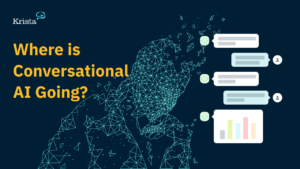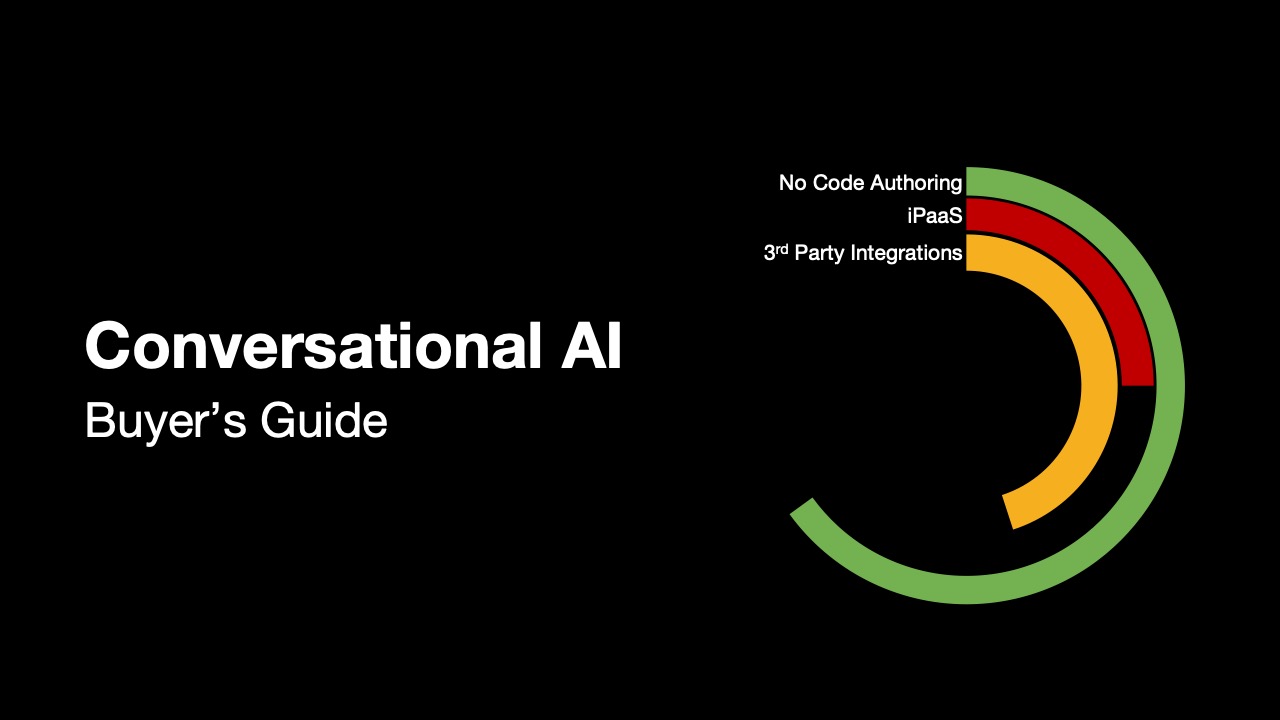What is Conversational AI?
Conversational AI (CAI) is a form of artificial intelligence (AI) that allows humans to communicate with computers in a natural way, using everyday language.
Conversational AI can be used to solve many different problems for businesses, including customer service interactions, employee service, and business operations like marketing, sales, IT, human resources, and more.
In this article, I will discuss how conversational AI works, the benefits it offers businesses and the difference between conversational AI and natural language processing (NLP).
How does Conversational AI work?
Conversational AI uses NLP to understand human conversational patterns. NLP is a branch of artificial intelligence that helps computers to understand, interpret and manipulate human language.
Conversational AI also takes advantage of machine learning, which is a method of teaching computers to learn from data without being explicitly programmed to perform a certain task. Machine learning is what allows conversational AI to improve over time, as it “learns” from the conversations it has with humans.
Conversational AI can be used in many different ways, but some of the most common use cases include helping customers and employees resolve issues and find information inside enterprise systems.
In customer service, CAI can be used to automate tasks such as answering frequently asked questions, routing customers to the right department, and providing support 24 hours a day. Employees can use conversational AI to find information about company policies, procedures, and benefits. In marketing, conversational AI can be used to personalize the customer experience, collect customer feedback and generate leads and sales can qualify leads, book appointments, and provide product recommendations.
How big is the conversational AI market?
 According to a recent study by Grand View Research, Inc., the worldwide conversational AI market is anticipated to reach $41.39 billion in 2030, growing at a CAGR of 23.6 percent from 2022 until 2030.
According to a recent study by Grand View Research, Inc., the worldwide conversational AI market is anticipated to reach $41.39 billion in 2030, growing at a CAGR of 23.6 percent from 2022 until 2030.
The growing popularity of AI technologies and consumer interaction through a variety of platforms are driving the market’s development. It implies that businesses and their customers see technology as a means to grow their enterprises and meet their needs, as conversational AI provides a more natural way to communicate that people are already used to.
What is the future of conversational AI?
 The future of conversational AI is very promising. As conversational AI and natural language processing (NLP) continue to evolve, they will become more and more integral in how businesses interact with customers and employees.
The future of conversational AI is very promising. As conversational AI and natural language processing (NLP) continue to evolve, they will become more and more integral in how businesses interact with customers and employees.
We will see more businesses using conversational AI to provide an appropriate response, automate tasks, improve customer service, increase sales and drive growth.
Conversational AI is becoming increasingly appealing to consumers, who prefer to interact with bots over digital channels. To improve customer satisfaction, cut costs, and achieve company goals, organizations are creating chatbots, voice assistants, and IVR experiences to meet customer expectations.
COVID-19 has had a big impact on conversational AI. Because of social distancing and shelter-in-place orders, there has been a big increase in demand for chatbots and conversational interfaces that can handle customer conversations remotely.
Benefits of Conversational AI?
Conversational AI can provide many benefits for businesses. It can help businesses automate customer support, improve customer engagement, and increase sales.
Additionally, conversational AI can help businesses save time and money by automating tasks that would otherwise need to be done manually.
Customer Service Performance
Conversational AI may take over customer service cases entirely on occasion, eliminating the need for human intervention. This might be the case for simple activities such as checking an account balance, tracking a delivery time, or finding out where a retail chain is located.
Agents will have more time on their hands when AI-led processes provide an appropriate response, allowing them to devote more attention to more difficult circumstances.
Upsell Options
Conversational AI may also provide consistent and convincing upsell possibilities. Instead of depending on a staff to remember to offer an upsell and select the most compelling option, conversational AI can incorporate consumer preferences, weather, and other factors to recommend the greatest possible upsell.
Better Conversion Rate
Sales may be boosted by providing useful information and updates promptly to clients through conversational chatbot. Virtual Assistants assist customers in locating the right product or service for particular industry requirements.
Effective Data Collection
Conversational AI is an excellent tool for gathering data. This data may be utilized to improve sales and marketing efforts after your customers save favorite items on their account for later purchase.
Salespeople may, for example, follow up with clients and provide them with more information about specific items of interest.
AI may also be used to track communication styles and assist your service agents in determining the most effective methods to engage your consumers.
Higher Productivity
Your customer service team is available 24/7 to help you with your questions. If the question is simple, an automated machine will answer frequently asked questions.
That way, the human customer service representatives can help more people at the same time. This also makes it so they can get to your question faster.
Enhance Service Speed
If you want to give your customers better service, reduce customer churn, and make more sales, you should automate data entry and remove manual tasks. Automating data entry with conversational AI will help keep data consistent between different channels and provide a better omnichannel experience. Conversational AI provides a personalized experience at much faster speeds.
What problems does conversational AI solve?
Below are some of the main problems that conversational AI can help solve:
Managing Risks
Conversational AI interfaces can be created and customized to meet demands for finance, auditing, and regulatory reporting that have a low threshold for error. When set up correctly, these interfaces generally outperform human agents in terms of value creation and data collection for reporting and compliance.
Simplifying Daily Tasks
Chatbots can help people find information quickly and simply. Imagine if a chatbot could assist an employee in scheduling time off after having a baby. The AI and subsequent automated processes could understand why the employee is out, notify managers, and offer to modify healthcare insurance information from this specific life event. Automating these processes saves time for the employee and human resources.
Provide On-Demand Support Outside of Regular Business Hours
The most prevalent use of chatbots is to provide fast answers at any time of day. Organizations that don’t give 24-hour support can answer queries when the office is closed. Doing so can save companies money by not needing to staff someone during non-business hours.
Customer Assistance
AI can help with customer service through self-service on web, mobile, and voice channels. This means that the customer can use a chatbot or voice bot to talk to the AI system and get help. If the AI system can’t answer the question, then advanced bots can invite another agent or escalate to a human agent who can.
Automating customer assistance solves a slew of operational difficulties that allow contact centers to fulfill their KPIs and become more efficient.
Difference between Conversational AI vs Traditional AI?
Conversational AI is a type of artificial intelligence that enables humans to communicate with machines. It involves natural language processing, which is the ability of a machine to understand human language, also known as machine learning.
Traditional AI, on the other hand, is a more general term that refers to any kind of artificial intelligence. This includes conversational AI, but also includes things like machine learning and deep learning.
Conversational AI is a newer field that’s emerged from traditional AI. It’s more focused on human-machine interaction, whereas traditional AI is more focused on machines doing things without the need for human interaction.
Conversational AI vs Natural Language Processing
Conversational AI and NLP are two terms that are often used interchangeably, but there is a big distinction between the two. NLP is a branch of AI that deals with understanding human language.
This can be used for tasks like speech recognition or text translation. Conversational AI, on the other hand, focuses on simulating human conversation. This can be used for things like chatbots or virtual assistants to provide interfaces to enterprise systems and automated processes.
So what are the differences between CAI and NLP? For one, CAI is more focused on emulating human conversation, while NLP is more concerned with understanding human language.
Additionally, conversational AI often relies on pre-written scripts or conversational rules, while NLP can be used to generate new responses based on the context of the conversation.
Consider the two subtopics of NLP that are especially important in conversational AI: natural language understanding ( NLU ) and natural language generation ( NLG ). NLP enables a computer or program to decipher language data based on context, purpose, syntax, and meaning, culminating in the machine’s ability to determine the intended meaning. The procedure by which the machine produces readable text is known as NLG.
How Businesses Can Use Conversational AI?
Conversational AI technology can be used by businesses in several ways. It can be used to improve customer service, to automate tasks, or even to create new products and services.
Some businesses use conversational AI to create chatbots. Chatbots are computer programs that can mimic human conversation. They are often used to provide customer service or to automate tasks.
Other businesses use conversational AI solutions to create virtual assistants. Virtual assistants are computer programs that can perform tasks on behalf of a human user. They are often used to schedule appointments, make phone calls, or send emails.
Some businesses use conversational AI applications to create new products and services. For example, a conversational AI system could be used to create a personal shopper service that helps users find the perfect gift for their loved ones.
Conversational AI can be used in a number of different ways to improve customer service, automate tasks, or even create new products and services. Businesses that are looking to use conversational AI should consider how it can be used to improve their business and how those improvements can be repeatedly automated.
Conversational AI Use Cases?
Conversational AI applications can be used for customer support, sales, marketing, and even human resources. It can automate simple tasks like scheduling appointments or providing information about a product. It can also handle more complex tasks like helping customers troubleshoot issues or providing personalized recommendations.
Data Collection
One of the most common uses for conversational AI is data collection. Businesses can use conversational AI to collect customer feedback or to gather information about customer preferences. This data can be used to improve products and services or to create new marketing campaigns.
Retail
Conversational AI tools can also be used in the retail industry. Retailers can use conversational AI to create chatbots that help customers find products, track orders, or even make recommendations. Additionally, conversational AI can be used to create virtual assistants that help customers with tasks like scheduling appointments or making returns.
Healthcare
Healthcare providers can use conversational AI to create an AI chatbot that answers patient questions or provide information about medical procedures. Additionally, CAI can be used to create virtual assistants that help patients schedule appointments or find doctors.
Finance and Banking
Conversational AI can also be used in the finance industry. Financial institutions can use conversational AI to create chatbots that help customers with tasks like making payments or transferring money. Additionally, conversational AI can be used to create virtual assistants that help customers with tasks like managing their finances or finding the best investment options.
Customer Service
A conversational AI tool can be used to improve customer service conversations in a number of ways. Businesses can use conversational AI to create chatbots that answer customer questions or provide information about products and services. Additionally, conversational AI can be used to create virtual assistants that help customers with tasks like scheduling appointments or making returns.
Marketing
Conversational AI can also be used for marketing purposes. Businesses can use conversational AI to create chatbots that provide information about products and services or that offer personalized recommendations. Additionally, conversational AI can be used to create virtual assistants that help customers with tasks like finding the best deals or coupons.
Sales
Conversational AI can also be used to improve sales conversations. Businesses can use conversational AI to create chatbots that help customers with tasks like finding the perfect product or making a purchase. Additionally, conversational AI can be used to help salespeople follow up with customers for renewals, send quotes, or make specific recommendations based on omnichannel interactions.
Human resources
Conversational AI can also be used in the human resources industry. Businesses can use conversational AI to create chatbots that help employees with tasks like finding information about benefits or filing a claim. Additionally, conversational AI can be used to create virtual assistants that help employees with tasks like scheduling interviews or scheduling time off.
Automate Enterprise Processes with Conversational AI
Conversational AI is a type of artificial intelligence that enables computers to communicate with humans in natural language. Conversational AI can be used to create a more personal experience for customers or employees by automating tasks such as customer service, sales, or enterprise processes to improve customer service, or increase sales.
Conversational AI has the potential to revolutionize the way businesses interact with their customers and employees. By automating tasks and providing support, conversational AI can help businesses improve efficiency and save time.
If you’re thinking about implementing conversational AI in your business, there are a few things to keep in mind.
First, consider what tasks you want to automate or improve with conversational AI. Find friction or pinch points in your employee or customer experiences.
Second, think about how you want your customers or employees to interact with the conversational AI system and what back-end systems you will integrate with. Integrate these processes into editable workflows so they are easy to modify as your business changes.
Finally, make sure to test and evaluate the conversational AI system before implementing it in your business. Download our conversational AI buyers guide to compare the features and capabilities of several of the top platforms.
With the right conversational AI system, your business can improve efficiency, save time, and create a more personal experience for customers or employees.






